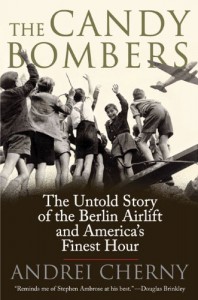Murder by Death
I read cozy and historical mysteries, a bit of Paranormal/UF, and to mix it up, I read science and gardening books on occasion.
The Candy Bombers: The Untold Story of the Berlin Airlift and America's Finest Hour

Talk about your non-fiction books that read like a novel. I could not put this book down and I stayed up too late a couple of nights because I just lost track of time.
I'm a child of the 70's but my parents were born in the 20's and my father was a Navy fighter pilot in WWII, but his orders were for the Pacific. All this to say I grew up with no direct stories of the European half of the war, had only vague knowledge of the Berlin blockade, and had never heard of Halvorsen and his Candy Bombs. Seeing a BL friend's review of this book, I was immediately sold and eager to learn more about it all.
Cherny does a great job of it. The narrative he pieces together is interesting and moving. I won't strictly call it academic: he has a very comprehensive Notes section at the back with citations and sources (no footnotes though) but I can't say the book is academically objective. The author's voice and his admiration for all of these men is evident. The Republican party takes a beating, too. I'm fine with all of this - I also admire what the allies accomplished and I'm way too far removed from any of these events to have any emotional bias; someone older, who lived closer to these events and the political parties of the times might not feel like being so objective, however.
Politics aside, I'd have to be inhuman not to be profoundly moved by the events of '48-'49 and the devastation of post-war Berlin. Both the horrific and the sublime. And I loved how, of all the heroes in this tale, not a single one of them was ever considered more than adequate by the people above them before or during the Berlin crisis. Only in hindsight was it really appreciated that these handful of men changed the world.
I didn't 5-star the book because it's long. There are bios at the beginning of all the major (American) players that I didn't appreciate as much as I probably should have and it was fully 300 pages before anything was said about candy. Still, those first 300 pages were interesting and they kept me going until the candy started dropping and the events of that year completely sucked me in. I think I enjoyed this book all the more because I was coming into it fresh - I didn't know exactly what happened next, and it added an element of suspense that those who are more educated about that time and place might not experience.
If you find yourself like me - woefully let down by your schooling in history - and want to learn more about the aftermath of WWII, I recommend this book. It's one I'd like to find in hardcover for my library shelves.
[PopSugar 2015 Challenge: A book with more than 500 pages.]
 14
14
 6
6



